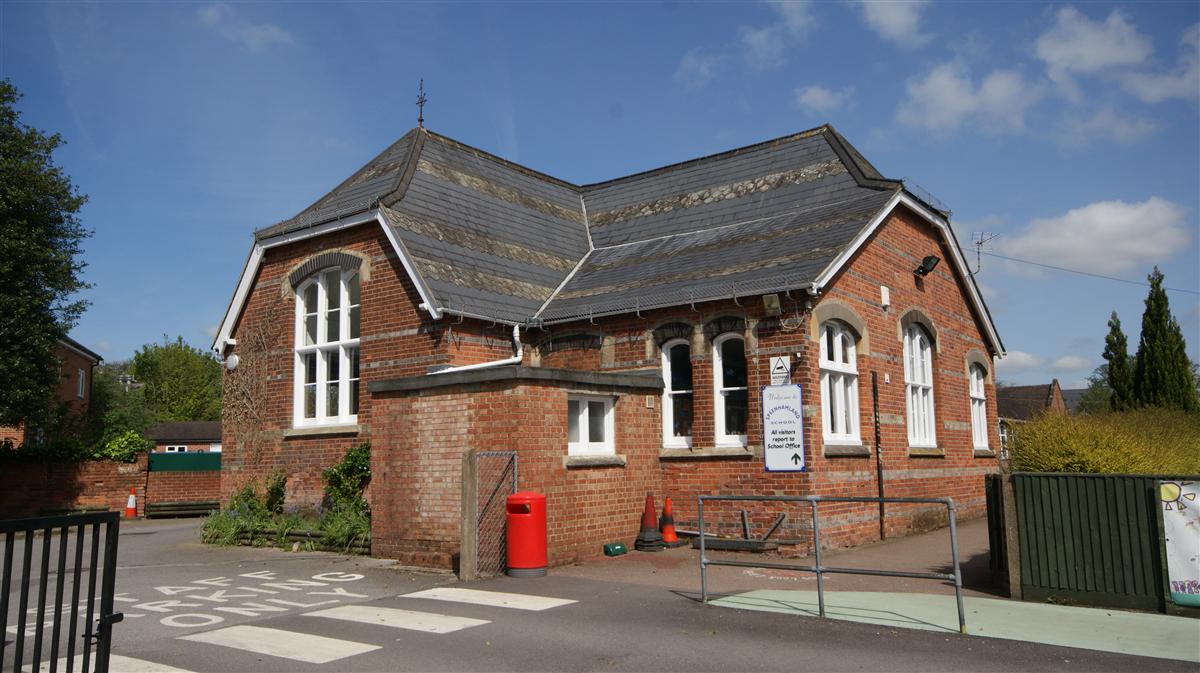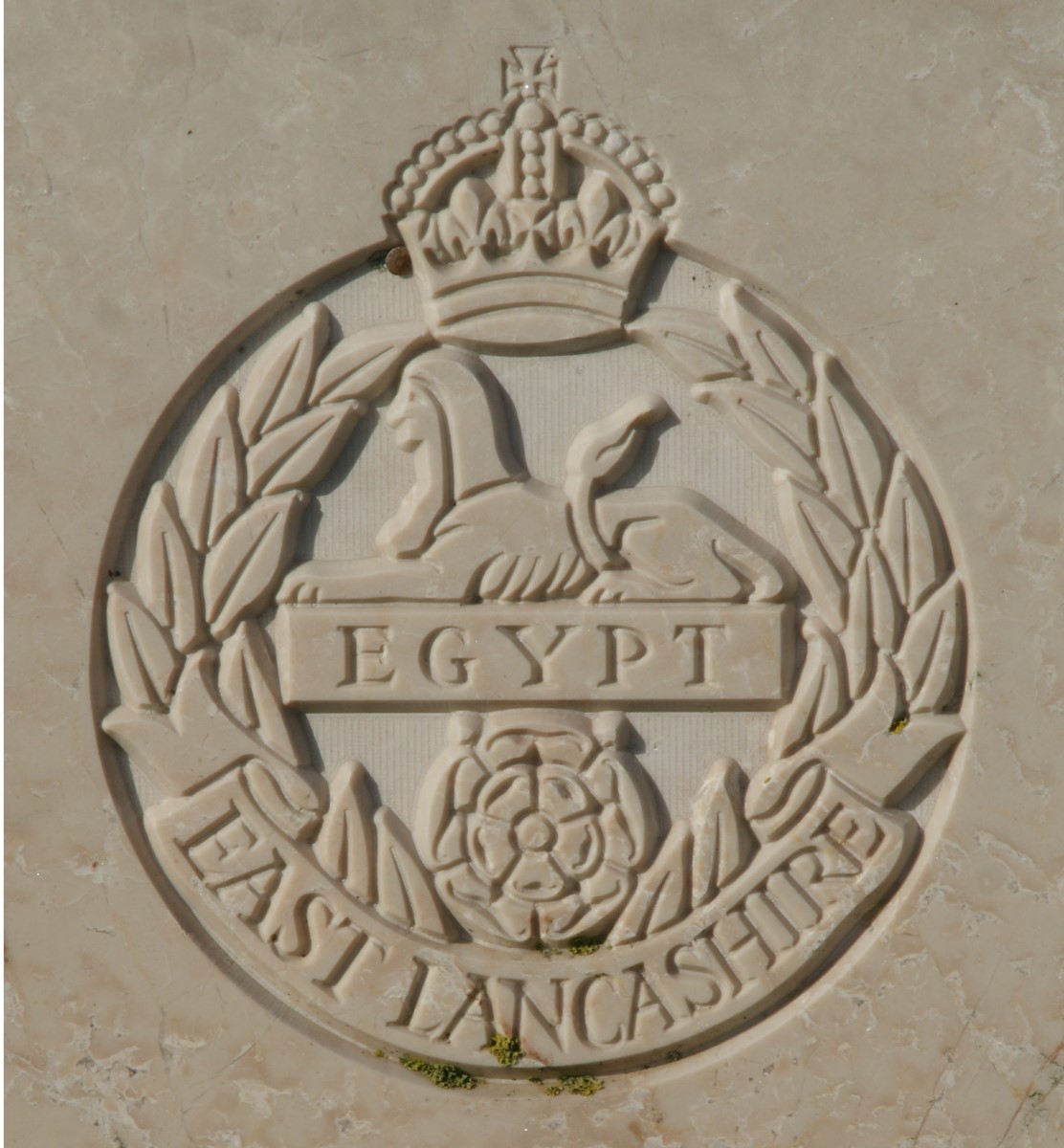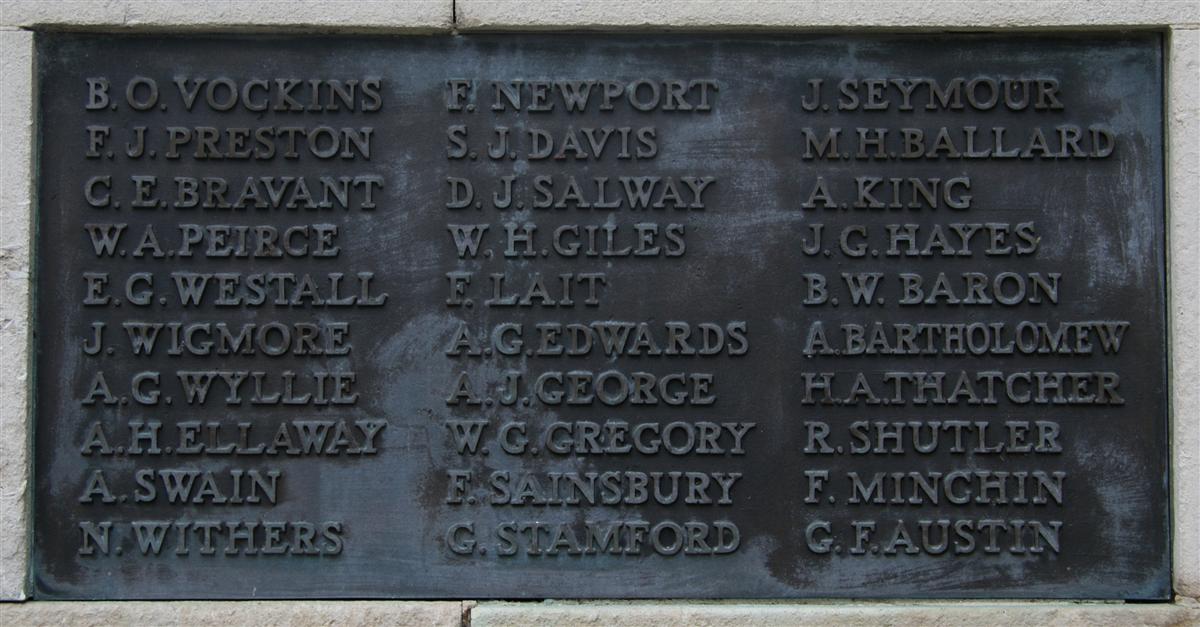Isaac Frank Minchin
Corporal 9882 Isaac Frank Minchin, 8th Battalion, East Lancashire Regiment.

Speenhamland School, where Frank received his education. |
Frank was born in Greenham in 1893 the youngest son of William Minchin and his wife Lucy née Goatley. The couple had nine children in all, but two died in infancy and a third, John died aged 7 in 1892. The full list being Fanny (born 1879 as Fanny Goatley a few weeks before her parents married), William James (1880-1880), Alice (1882), Ada (1883-1883), John (1885-1892), Bertie (1887), Ada Bessie (1890), Isaac Frank (1890) and Ellen (1894).
The family spent many years in Jackson’s Cottages, Greenham before they moved to 1 Essex Place, Speen and then out to a cottage in Woodspeen West, a rural area of Speen. William worked at a variety of labouring jobs, including a period as a platelayer on the Newbury-Lambourn Railway, before becoming a road man employed by Berkshire County Council.
Frank was educated to a basic standard at the Speenhamland School, before entering the job market and his teens at around the same time.

The badge of the East Lancashire Regiment - as used on Commonwealth War Graves. |
It appears that he joined the East Lancashire Regiment in 1908 (the date being inferred from his regimental number). At that date he was still only fifteen, so would have signed on as a boy soldier, not committing to full service until he was eighteen (in 1911) at which point he would have signed on for a twelve-year term, five years with the colours followed by seven in the Reserve. He was posted to the Regiment’s 1st Battalion, stationed at Knaphill Barracks near Woking in Surrey. Before his five years were up Britain was at war, so there was no prospect of a return to civilian life.
He crossed to France with the 1st Battalion, East Lancashire Regiment landing at Le Havre on 22 August 1914. The battalion was a part of 11th Brigade in the 4th Division. This was the fifth division to be sent to France, the original British Expeditionary Force comprising I Corps (1st & 2nd Divisions) and II Corps (3rd & 5th Divisions). The 4th Division arrived too late to take part in the Battle of Mons, but reached the retreating II Corps as they rested for the night at Le Cateau. The arrival of 4th Division encouraged II Corps commander, General Smith-Dorrien, to make a stand at Le Cateau against the orders of BEF commander, Sir John French. Historians have mixed views about the Battle of Le Cateau, but the balance of opinion seems to see it as being key to the survival of the BEF. Not that II Corps won the battle, they didn’t, but their stand is seen as serving to persuade the German commander, Von Kluck, that there were more British in France than there actually were and to delay the German advance for long enough to allow the battered BEF to slip away towards Paris.
By the time winter arrived the BEF had taken part in the Battle of the Marne and the pursuit of the Germans back to the Aisne before being moved north to the defence of the last remnant of Belgium that was not in German hands - the Ypres Salient. After a desperate defence Ypres held (just) and the BEF settled in for a hard winter in very rough and ready trenches. Conditions were appalling, and many men suffered from frostbite; severe cases, including Frank, were sent back to England for treatment and convalescence. During his period back in England he was transferred to the Regiment’s 3rd (Reserve) Battalion.
Having recovered, Frank returned to France, but not back to his old unit - the 1st Battalion; instead he crossed with the 8th (Service) Battalion. As the new ‘Kitchener’ or Service battalions were created from the rush of new volunteers, a leavening of experienced men were included to provide junior NCOs with some Army experience. Men with front-line experience were few and far between; Frank, aged only 22, was probably seen as an ideal man to help the new soldiers acclimatise to the trenches. This was almost certainly when Frank was promoted to become a Corporal in charge of a section.
On 16 January 1916 the battalion was manning the line near Foncquevillers; officially this was the day that Frank died; for years to come it was the day they marked his death, and it remains the date recorded by the Commonwealth War Graves Commission. However, the battalion war diary, which is amazingly detailed regarding casualties in this period, records the following:
War Diary, 8th Battalion, East Lancashire Regiment - 18th January 1916
Fonquevillers: Cpl Minchin was wounded under the heart and died of wounds same day. Situation remains quiet, between 7 & 8 pm starting near MONCHY 3 Green rockets were sent up in rapid succession then after short interval this was repeated a little farther South and was carried down the line to GOMMECOURT. Patrols met. Lt Thompson and one man were examining our wire opposite Trench 54 when a patrol of about 12 Germans opened fire hitting 2/Lt Thompson in the ear, the Patrol then retired.
So it seems that Frank had two more days than his family were led to understand.
News of his death reached Newbury:
Newbury Weekly News, 17 February 1916 – Killed in Action
MINCHIN – Jan 16, in the trenches “Somewhere in France,” Corporal Frank Minchin, of the 8th Batt East Lancashires, second son of Mr and Mrs William Minchin, of Woodspeen West, Newbury, Berks.
More details were printed in the news columns:
Newbury Weekly News, 17 February 1916 - Woodspeen West
ANOTHER LIFE GIVEN FOR HIS COUNTRY
A great sorrow has fallen on Mr and Mrs William Minchin, the news of the death of their second son, Corporal Frank Minchin, having been at length officially confirmed. The first official report was received on the 4th from the Infantry Record Office, as follows:- “Sir, - It is my painful duty to inform you that a report has this day been received from the War Office, notifying the death of No 9,882 Corporal Frank Minchin, 8th Batt East Lancs, which occurred at place not yet stated, on the 15th January, 1916, and I am to express to you the sympathy and regret of the Army Council at your loss. The cause of death was “Died of Wounds.” The following message of sympathy from the King and Queen, was also received: “The King commands me to assure you of the true sympathy of His Majesty and the Queen in your sorrow. – Kitchener.”
The report of the death from the Infantry Record Offices was followed by a letter from the same source, the 7th February, as follows: “Sir, I have to inform you that a report has this day been received from the War Office to the effect that Corporal Frank Minchin, 8th Batt East Lancs, has been buried at the Parish Church, Henu, January 16th, 1916.”
The brave young soldier (he was only 23 years of age), was in several serious engagements, and was invalided home on leave a year ago suffering from frost bite. He was engaged to be married, and the wedding had been fixed for the next leave he could obtain, which in the usual course would have been very shortly.
The following letter received from Sergt Lovick, by Mrs Minchin, no doubt affords consolation and satisfaction to the bereaved parents:- “Dear Madam, In answer to your letter dated January 31st, 1916, I will give you as fully as possible the details of your son’s death. He was mortally wounded while carrying out his duty in the trenches, and died on his way to hospital. He was fully aware that he was not to recover from his wound. He was shot through the left side of the body, and everything was done for him that was possible, but his wound was beyond all human aid. He was continuously asking for his people at home, and the last words he spoke were for you and those he loved. He is buried in a pretty little churchyard, not far from here. A cross has been erected over his grave. I can assure you the grave will be attended while the battalion is here. Your son died as only men of his strain can die. Never before has any man died braver or better, and he proved to us all that he was a hero to the end, thinking of those he loved to the last. I can assure you we have lost a good NCO and a dear comrade, and we feel his loss greatly. I am requested to express the deepest sympathy of Officers, NCOs, and men of the B Company, for your sad loss of such a splendid man as you son. I remain, ‘yours in sympathy.’ Sergt Lovick.”
The churchyard mentioned (where Frank was buried) is at Henu the village close behind the lines where he fell.

Frank's name on Newbury War Memorial (lower right) |
Locally he is remembered (as F Minchin) on Tablet 4 of Newbury Town War Memorial, and the Speenhamland Shrine (formerly in St Mary’s, Speenhamland, this was the parish memorial for the northern part of Newbury). His name (Frank Minchin) was also on the lost memorial to the deceased former pupils of Speenhamland School. The only appearance of his full name, Isaac Frank Minchin, is on Speen War Memorial.
His family certainly didn’t forget him:
Newbury Weekly News, 18 January 1917 - In Memoriam
In ever loving memory of Corpl F Minchin, East Lancs Regt, who died of bullet wounds received at Henu, January 16th, 1916, aged 23.
One year has gone, still we miss him,
Never can his memory fade;
Far away across the ocean
In a distant land he’s laid.
No friend near him to caress him,
None to wipe away a tear;
Called from earth to be with Jesus,
One we loved so very dear.
From his sorrowing Father, Mother, Brother and Sisters, also his devoted friend Nurse Jobe
.
Newbury Weekly News, 18 January 1918 - In Memoriam
In loving memory of Corpl Frank Minchin, East Lancs Regt, who died for his King and Country January 16th, 1916.
We do not forget him, we loved him too dearly
For his memory to fade from our minds like a dream;
Our lips need not speak while our hearts mourn sincerely,
True grief often dwells where it seldom is seen.
From his loving Parents, Brother, and Sisters, also his devoted friend, Nurse Jobe.
These messages of remembrance add a mystery to Frank’s story - who was Nurse Jobe? Did he leave a sweetheart to mourn his loss?
The Infantry Record Office still had a further complication to add to Frank’s family’s confusion. When his regiment compiled the medal roll of men qualified for the 1914 or Mons Star, Frank was entered as Frank Mitchin (as he was in the battalion’s 1911 census return). Thus they did not notice when the 8th Battalion submitted its roll for the award of the 1914-15 Star and included Frank Minchin (though the two had the same regimental number). It is nice to think that Frank was actually awarded both medals - the award of which should be mutually exclusive. Sadly his service record did not survive the blitz, and it is not possible to determine whether this mistake was ever corrected (though it almost certainly was).

Find a memorial :
| Died this day: | |
| 03 February 1917 | |
| F G Savage | |
| Newbury |

Like this site? Show your appreciation through a donation to a great charity.